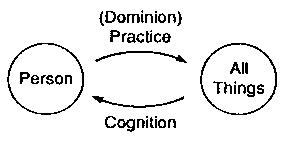Kant's Moral Philosophy
| Blessing that Overcomes Historic Boundaries | |
| Sun Myung Moon: Revolution of Heart | |
| Five Curious Facts about the Unification Church | |
| Prophecy: "Christ will Return, Religions will Unite" |
An Appraisal of Traditional Theories of Education from the Standpoint of Unification Thought Ethics |
Kant's and Marx's Epistemologies from the Perspective of Unification Thought
A. Critique of Kant's Epistemology
1. Critique of the Transcendent Method
Kant asserted that the subject is endowed with a priori form is of thought (categories). This statement, needless to say, represents Kant's position of not acknowledging forms of existence in the external world. However, when we examine them well, we realize that there are forms of existence that correspond to the forms of thought. For example, all things in the objective world exist and perform their motion in the form of time and space. Also, scientists can deliberately give rise to a certain phenomenon oil the basis of' time and space in the objective world. Therefore, the form of time and space is not only a subjective form, but an objective form as well.
The same can be said about the form of causality. Scientists have discovered numerous relations of cause and effect from the phenomena of the natural world and have come to be able to reproduce similar phenomena on the basis of the relations of cause and effect. This indicates that indeed there are relations of cause and effect in the objective world.
Also, Kant said that an object of cognition is established through the combination of the form of the subject and the content coming from the object. From the perspective of Unification Thought, the subject (person) as well as the object (all things) have both content and form. What the subject possesses is not what Kant called "a priori forms" alone; rather, it is previously existing prototypes, which have both content and form and, therefore, include the forms mentioned by Kant. Also, what comes from the object is not a chaotic manifold of sensations, but rather sensory content organized by the forms of existence.
Furthermore, the subject (person) and object (all things) are in a correlative relationship and bear resemblance to each other. Therefore, cognition is not carried out through synthesis of the object; rather, cognition is carried out as the "content and form" (the prototype) of the subject, and the "content and form" of the object are collated through give-and-receive action between them, and a judgment is made.
2. Critique of Kantian Agnosticism
Kant thought that only natural, scientific knowledge in the phenomenal world is true, and he considered the world of things-in-themselves (the noumenal reality) uncognizable. Consequently, lie entirely separated the phenomenal reality from the noumenal reality. This led to the separation between pure reason and practical reason, and the separation between science and religion.
From the perspective of Unification Thought, the thing-in-itself is the Sungsang of a thing, while the sensory content is its Hyungsang. Sungsang and Hyungsang are unified in all things, and since Sungsang is expressed through Hyungsang, we can know the Sungsang of a thing through its Hyungsang.
In addition, according to Unification Thought, the human being is the lord of dominion over all things, or the lord of creation, and all things were created in resemblance to the human being, as objects of joy to human beings. This means that the human being and all things resemble each other in structure and in elements; accordingly, they resemble each other in content and in form as well. Therefore, in cognition, the content and form possessed by the subject (human being) are similar to the content and form possessed by all things, and they can be collated. In addition, since through its content the thing-in-itself, namely, the Sungsang of the object, is expressed, the subject can cognize not only the Hyungsang (sensory content and form) of the object, but also its Sungsang (the thing-in-itself). Since Kant was ignorant of the principled relationship between mankind and all things, lie fell into agnosticism.
B. Critique of Marxist Epistemology
1. Critique of the Theory of Reflection
As explained in the section on Unification Epistemology, if there is no prototype within the subject of cognition that corresponds to the things in the external world as criteria for judgment, cognition cannot be made, even if the external world is reflected on the consciousness. Moreover, since cognition is carried out through the give-and-receive action between subject and object, it is necessary for the subject to have interest in the object. Even though an object in the external world is reflected on the consciousness of the subject, if the subject has no interest in the object, cognition will riot take place. This means that cognition is not carried out through a passive material process like reflection, but becomes possible only through the participation of an active mental process (i.e., interest in the object and the function of collation).
2. Critique of Sensory Cognition, Rational Cognition, and Practice
In Marxist epistemology, the process of cognition consists of three states, namely, sensory cognition, rational cognition, and practice.
The important question here is how consciousness, which is field to be a product or a function of the brain and to reflect the objective world, can make rational (logical) cognition (i.e., abstraction, judgment, inference), and moreover, how it can direct practice (revolutionary practice). Even though there is a wide gap between the passive process of reflecting the external world on one hand, and rational cognition and the active process of practice on the other, no reasonable explanation is given. This means that there is a logical gap here in the Marxist view.
From the perspective of Unification Thought, cognition and practice can never be made based solely on the physiological processes of the brain. This is because cognitive action takes place through the give-and-receive action between the mind and the brain. In other words, cognition and practice are carried out through a relationship of give-and-receive action between the mind, which possesses the function of understanding and reason, and the brain.
The next question concerns the role of practice in cognition. Lenin said that cognition proceeds to practice, and Mao Tse-tung asserted that cognition and practice are inseparable. In this respect, Unification Thought has no objection. All things were created as objects of joy for human beings, and we are to exercise dominion (practice) over all things. Accordingly, we cognize all things in order to exercise dominion (practice). Cognition and practice form a correlative circuit of give-and-receive action between human beings and all things (Fig. 9-12). Thus, there is no cognition apart from practice (dominion), and no practice (dominion) apart from cognition.

Fig. 9-12: Correlativity of Cognition and Practice
Practice, as advocated by Marxism, is ultimately directed toward revolution. Contrary to that, Unification Thought asserts that neither cognition nor practice is ever carried out with revolution as its objective, but rather, they are carried out for the actualization of the purpose of creation. The purpose of creation is actualized when (1) God exercises dominion over human beings with love, and human beings return beauty to God; and (2) human beings exercise dominion over all things with love, and all things return beauty to human beings-whereby joy is realized in God and human beings. Therefore, both cognition and practice are carried out for the purpose of obtaining joy through love.
3. Critique of the Communist Concepts of Absolute Truth and Relative Truth
Lenin and Mao Tse-tung acknowledged the existence of absolute truth, saying that human being infinitely approaches absolute truth by repeating cognition and practice. Yet, their concept of "absolute" is ambiguous. Lenin said that the sum-total of relative truths is the absolute truth. No matter how we may sum up relative truths, however, the result is simply relative truths summed up, and cannot become absolute truth.
Absolute truth refers to the universal, eternal truth. Therefore, without having the Absolute Being as the standard, the concept of absolute cannot be established. Absolute truth is one with, and inseparable from, the absolute love of God, as explained in "Axiology." This is the same as the way in which the warmth and brightness of sunlight are one and inseparable. Therefore, there can be no absolute truth apart from God's absolute love. Consequently, only when centered on God's love, will the human being understand the purpose of creation of all things and obtain true knowledge of them. Therefore, if God is denied, there is no way to obtain absolute truth, no matter how strenuously one may engage in practice.






















No comments:
Post a Comment